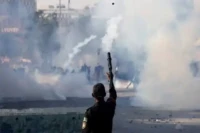In a significant blow to the operations of notorious bandit leader Bello Turji, a school building in Fakai village, which had been converted into a food storage facility, was completely destroyed. This event marks a notable disruption in the logistical capabilities of one of the region’s most feared bandit groups.
The building, once a place of learning, had been repurposed by the bandits to store large quantities of food supplies, serving as a critical logistical hub. This conversion into a storage facility was part of Turji’s strategy to sustain his group’s operations amidst ongoing conflicts in the region. By having a stockpile of essentials, the bandits could maintain their presence and continue their activities without the immediate need to forage or raid for supplies.
The destruction of this facility, leaving the structure in ruins, represents a strategic setback for Turji’s network. According to local sources, the obliteration of the food stockpile not only deprives the bandits of immediate resources but also forces them to rethink their supply chain logistics. This disruption could potentially limit their operational scope, making it harder for them to sustain prolonged activities or control over the areas they’ve influenced.
Counter-terrorism expert Zagazola Makama has highlighted that this incident is part of broader efforts to dismantle the infrastructure supporting banditry in the region. The destruction of such a key resource node demonstrates a tactical approach by security forces or vigilante groups aiming to weaken the bandits by targeting their sustenance and operational capabilities.
For the residents of Fakai village and neighboring communities, this event is a beacon of hope. It suggests that concerted efforts are being made to reclaim areas from bandit control, potentially leading to a return to normalcy where schools can once again serve their educational purpose rather than as armories or storage units for criminal enterprises.
This action against Turji’s logistics might also serve as a deterrent to other bandit groups considering similar uses for civilian infrastructure, sending a message that such activities will be met with decisive countermeasures. However, while this is a victory, it is also a reminder of the ongoing challenges in restoring security and governance in areas plagued by banditry, emphasizing the need for continuous and comprehensive strategies to address both the symptoms and root causes of such criminal activities.












This article raises questions about the effectiveness of the governments efforts. Do you think this will truly impact Bello Turjis operations?
Wow, I wonder if this will actually make a dent in Bello Turjis operations or if its just a temporary setback. Thoughts?
Do you think this will really impact Bello Turjis operations, or will they just relocate and continue business as usual? 🤔
This article raises doubts – was the Bandit Stronghold really destroyed or just relocated? Bello Turjis cunning tactics leave us wondering.
Wow, can you believe Bello Turjis stronghold got taken down? Do you think this will actually make a dent in his operations?
Wow, do you think this will actually weaken Bello Turjis influence in the region? Or will he bounce back stronger? 🤔
I cant believe they finally took down Bello Turjis stronghold! Do you think this will actually make a difference in reducing crime in the area?
This could actually escalate the bandit situation in the area instead of solving it. What do you guys think?